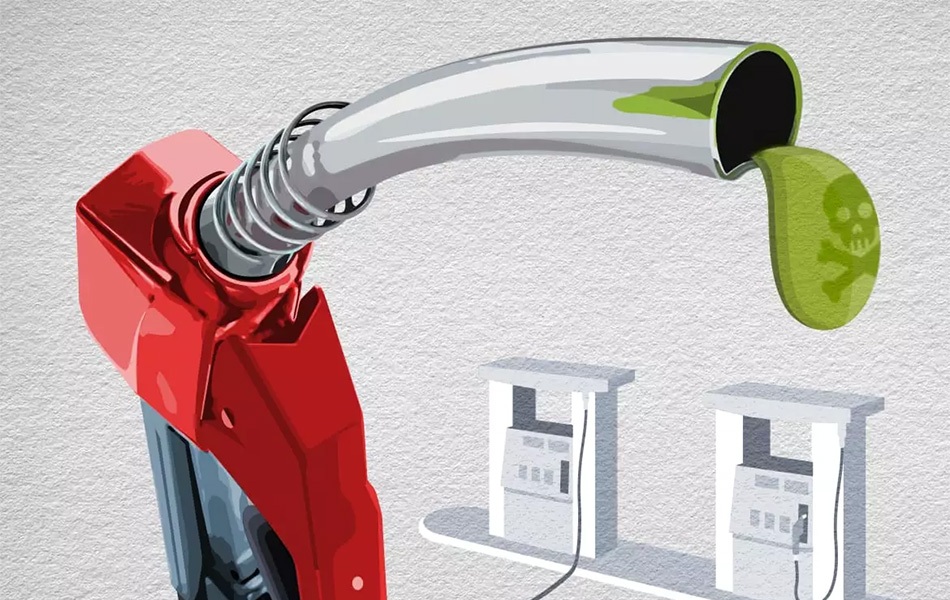
Contaminated fuel can cause a wide range of damages to your vehicle’s fuel system and engine. Fuel contamination occurs when substances other than the proper fuel mix (such as dirt, water, rust, or microbial growth) enter the fuel tank or fuel lines, potentially leading to severe performance issues or costly repairs.
Here’s a breakdown of the types of fuel contamination and the damages they can cause:
1. Water Contamination
Water contamination is one of the most common types of fuel contamination and can occur in several ways:
- Moisture in the air (humidity) that mixes with ethanol (in ethanol-blended fuels like E10).
- Water entering the tank due to condensation or rain.
- Phase separation (in ethanol blends) when water and ethanol separate from the gasoline.
Damages Caused by Water Contamination:
- Engine misfires or stalling: Water in the fuel can prevent proper combustion, leading to misfires, rough idling, or stalling.
- Rust and corrosion: Water can cause rust in the fuel tank, fuel lines, fuel injectors, and fuel pump. Rust particles can clog fuel filters and injectors, leading to reduced fuel flow and engine performance issues.
- Clogged fuel filters: Water can cause clogging of the fuel filter and injectors, leading to poor engine performance, stalling, and difficulty starting the engine.
- Corrosion of the fuel system: Over time, prolonged exposure to water can corrode critical components like fuel lines, fuel injectors, and fuel pumps, leading to more expensive repairs.
2. Dirt and Debris
Fuel can become contaminated with dirt, dust, or debris during filling, storage, or transportation. This can happen if the fuel is stored in an improperly sealed container, or if there’s a problem at the fuel station.
Damages Caused by Dirt and Debris:
- Clogged fuel injectors: Dirt can block fuel injectors, leading to uneven fuel delivery to the engine, poor combustion, and reduced engine performance.
- Fuel pump damage: Dirt can wear out or damage the fuel pump by causing it to overwork or become clogged. This may lead to fuel starvation (insufficient fuel flow to the engine) and premature fuel pump failure.
- Clogged fuel filters: Dirt and debris can clog the fuel filter, restricting fuel flow to the engine. This can cause the engine to run lean (with too little fuel), leading to poor performance, misfires, or engine failure.
3. Contaminated or Poor-Quality Fuel (Additives)
Fuel can be contaminated with additives or improperly mixed fuel, such as incorrect ratios of ethanol or poor-quality gasoline that doesn’t meet the standards. This often occurs when filling up at unreliable sources or when old fuel is used.
Damages Caused by Contaminated or Poor-Quality Fuel:
- Engine knocking: Poor-quality fuel can cause engine knocking or pinging (pre-detonation), which occurs when fuel ignites too early in the combustion cycle. This can cause long-term engine damage if not addressed.
- Carbon buildup: Low-quality fuel may lead to an increase in carbon buildup on the fuel injectors and inside the combustion chamber, leading to poor fuel efficiency, rough idle, and potential damage to the engine over time.
- Corrosion: In some cases, poor-quality fuel can have a higher level of sulfur, which can cause corrosion of metal components like the fuel injectors, fuel tank, and exhaust system.
- Damage to sensors: Impurities or additives in contaminated fuel can harm oxygen sensors and fuel pressure regulators, leading to engine performance issues and costly sensor replacements.
4. Microbial Growth (Biofilms or Algae)
In diesel fuel, microbial contamination can occur, especially in marine vessels or vehicles that don’t use fuel regularly. Microbes (bacteria, fungi, or algae) can form biofilms on the inner surfaces of fuel tanks.
Damages Caused by Microbial Growth:
- Clogged filters: Microbial growth can form sludge or gel-like substances, which can clog fuel filters, leading to fuel flow restrictions and engine performance issues.
- Fuel tank and line corrosion: The microbial growth can cause rust or corrosion in the fuel tank and fuel lines, which compromises the integrity of the fuel system.
- Injector clogging: Microbial contamination can clog fuel injectors, leading to improper fuel atomization, poor combustion, and a noticeable drop in engine performance.
- Reduced fuel quality: Microbial contamination can degrade the quality of the fuel, making it less effective at combusting properly, which may result in engine misfires, reduced power, or difficulty starting.

